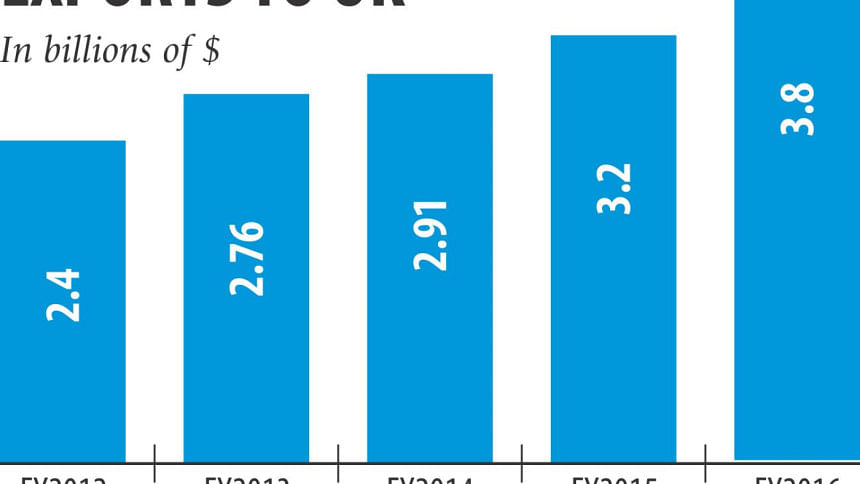Exporters fear price cuts as pound falls

Bangladeshi exporters to the UK are starring at another round of price cuts due to the freefall of pound sterling against the US dollar over Brexit issues.
The currency fell off a cliff on Thursday to strike a 31-year low of $1.1841 before rebounding to upwards of $1.2439 on Friday, according to the AFP.
The UK is the third largest export destination for Bangladesh after the US and Germany, accounting for 11.13 percent of the total shipments.
In fiscal 2015-16, Bangladesh exported $3.80 billion worth of goods to the UK, registering a 6.01 percent year-on-year growth, according to data from the Export Promotion Bureau.
Of the total shipments to the UK in a year, 80 percent are garment items. And because of a sizeable Bangladeshi community in Britain, there is high demand for local fruits and vegetables as well.
The freefall of the pound means the British consumers will have to pay more for the same basket of goods, so they can cut back on their expenditure.
This can prompt British retailers to demand price cuts from exporters to maintain the demand at home.
“First of all, it is my opinion that Britain should not leave the EU,” said Abdus Salam Murshedy, managing director of Envoy Group, a leading garment exporter to the UK.
Following Britain's decision to leave the European Union in June this year, the British buyers have started putting pressure on Bangladeshi manufacturers for price cuts, he said.
But Bangladeshi garment makers are already squeezed due to the higher costs of production for mounting pressure from the international community for compliance.
Bangladesh exports nearly $3.5 billion worth of garment items to the UK a year, according to Murshedy.
Before Brexit, local exporters used to receive Tk 115 against a pound, but now it has come down to Tk 97-Tk 98.
Besides, Brexit puts the third world countries including Bangladesh in a very uncertain place as it is not known yet if the UK will continue with the EU's Generalised System of Preferences scheme on shipments, he added. Bangladesh has been enjoying the zero-duty benefit on exports to the EU under the scheme since 1971.
“The freefall of the currency is a sign of the weakening of the British economy, meaning the demand for goods in the UK will decline. If it happens, exports from Bangladesh might drop,” said Mustafizur Rahman, executive director of the Centre for Policy Dialogue.The direct impact of the freefall of the British currency on Bangladesh is relatively low as other currencies like the US dollars have also appreciated, he said.
“Vegetable exports to the UK will go down if the freefall of the UK currency prolongs,” said Mohammed Mansur, general secretary of Bangladesh Fruits, Vegetables and Allied Products Exporters' Association.
Exporters will lose money and finally they will feel discouraged to export perishable goods, he said. In such a scenario, the exporters will ship as much as needed -- and not too much -- to keep a good relationship with the importers.
Bangladesh exports at least 12 tonnes of vegetables and fruits to the UK every day, he said, adding that the UK is also a major hub for exporting vegetables and fruits to other European countries.

 For all latest news, follow The Daily Star's Google News channel.
For all latest news, follow The Daily Star's Google News channel. 



Comments